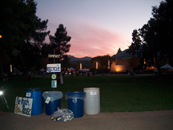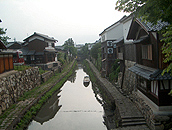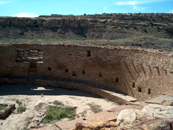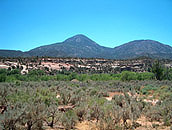About
Our Story
Katherine's Story
 The seeds for Peakinsight were planted at Earth Day in 1970. Twenty million grassroots demonstrators gathered in teach-ins across the USA to learn about what was happening with the environment. I participated in educational sessions and recycling projects at my school. Session topics included nuclear power, pesticides, waste, and the population explosion. That first Earth Day was an incredible triumph of self-organizing forces. It shaped the values of many people in my generation, including my own. It felt like people could really make a difference.
The seeds for Peakinsight were planted at Earth Day in 1970. Twenty million grassroots demonstrators gathered in teach-ins across the USA to learn about what was happening with the environment. I participated in educational sessions and recycling projects at my school. Session topics included nuclear power, pesticides, waste, and the population explosion. That first Earth Day was an incredible triumph of self-organizing forces. It shaped the values of many people in my generation, including my own. It felt like people could really make a difference. While pursuing a stimulating and rewarding career in organizational consulting, I turned away from environmental issues. I was working 80 hours/week by the time I moved to Tokyo in 1993. My life was completely out of balance with no time to think about the environment, much less do anything constructive.
While pursuing a stimulating and rewarding career in organizational consulting, I turned away from environmental issues. I was working 80 hours/week by the time I moved to Tokyo in 1993. My life was completely out of balance with no time to think about the environment, much less do anything constructive.
During the next few years, my travels in China and India introduced me to people living at opposite ends of the economic spectrum. The differences between the haves and have-nots were not only striking, they were also life-altering. My understanding of globalization also began to shift, as I witnessed the impact of industrial development on other societies. In 1998, I attended a retreat at Taos Pueblo in the mountains of New Mexico. There I learned about the Native American idea of considering the impact of our decisions on the seventh generation into the future. The following year I went camping in Chaco Canyon, where I hiked among the ruins of a lost civilization and reflected on our own fate. Along the way I decided to write a book about 'peak insight' based on my learnings about personal and organizational change.
In 1998, I attended a retreat at Taos Pueblo in the mountains of New Mexico. There I learned about the Native American idea of considering the impact of our decisions on the seventh generation into the future. The following year I went camping in Chaco Canyon, where I hiked among the ruins of a lost civilization and reflected on our own fate. Along the way I decided to write a book about 'peak insight' based on my learnings about personal and organizational change.
During my 16 years with Personnel Decisions International (PDI), I worked with many Fortune 500 companies. Some of the people I coached were disenfranchised and cynical about bosses who focused on quarterly results and avoided investing in longer-term strategies. I saw entrepreneurs abandon organizations they described as stagnant. I saw innovators leaving organizations they loved in order to seek growth opportunities elsewhere. And I saw people performing below their capabilities, conserving energy rather than sharing it.
These cases reflected a malaise in business that piqued my curiosity. I wondered what it would take to unleash people's creative spirit, to have their personal passion fuel growth in their organizations. When I left PDI in 2000 to establish my own firm, I began by taking a sabbatical to pursue these questions. Our planet needs help. So does the seventh generation. So do the dispirited people who can be found in many organizations. I spent years coaching executives on aligning their passions with a mission they could pursue wholeheartedly. Now I'm doing that for myself as well.
Our planet needs help. So does the seventh generation. So do the dispirited people who can be found in many organizations. I spent years coaching executives on aligning their passions with a mission they could pursue wholeheartedly. Now I'm doing that for myself as well.
Peakinsight will continue evolving as we work with clients and colleagues on creating new stories.
Carol's Story
I recently read an article about how a good many baby-boomers are now reaching a kind of epiphany in their lives, reassessing and reexamining the kind of work they do and whether it matched their vision of true lifework. If it turned out to not match, many were leaving their comfortable and secure jobs to pursue something that felt more like their true work, something they felt connected to and could contribute to in a meaningful and deep way.Back in the 70s, I can remember stickering my notebooks with those cool 'Ecology' symbols, and doodling them all over the margins of my notepaper. Even though I knew little about the true science of ecology, I felt somehow connected with this field of study. So, I went on to major in Forestry, a choice that would put me out in the field of trees, managing public lands and its resources for healthy ecosystems, encouraging multiple uses by recreationists, but leaving some untouched, allowing Mother Nature to do her thing naturally.
Later, I chose 'place' over 'lifework' in order to raise my family in a healthy community, surrounded by spectacular mountain peaks, with clean air and water, and ample opportunities for many outdoor adventures. Leaving my work among the trees, I instead found a career managing a bookstore for many years, engaging with customers about the world of literature.
Over the years of living here in Durango, Colorado, where at one time the air on Molas Pass was ranked among the cleanest air on earth with visibilities of 100 miles, I began to hear that that was not holding true any longer. Why? It's this kind of stuff that gnaws at us. The stuff closest to 'home' is maybe where it's first noticed, but then you realize that reports of detrimental global changes in the environment are numerous.
On an individual basis, most anyone would say they support doing things in their personal lives that would contribute to the planet's health and vitality. These personal views are not always carried forward into their work lives, however. Businesses have an enormous potential to positively impact the way in which we live on this earth. We all need to rethink how we do business, how we do our work, and find ways to do it sustainably, in harmony with the earth. This is important not only for the longevity of the land and its resources, but for the longevity and vitality of our businesses and workplaces. That is why I've joined Peakinsight - to make my contribution in helping to ensure that this beautiful place that is our home will be healthy and thriving far into the future, and to pass this value on to my kids so that it takes root and grows, generation by generation.
'Ultimate Places exist entirely on their own, not for you, or in spite of you, or because of you. They are what they are, and if you hang around them long enough, you may be tempted to commit philosophy.'
-Tim Cahill

